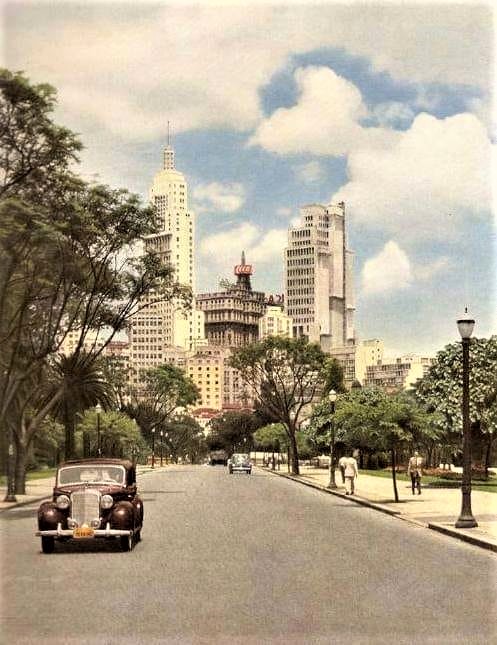1960.
Parque Dom Pedro is a low-lying area where Rio Tamanduateí runs. As it was prone to get flooded every year they decided to make a greaty park out of it. An amusement park called Parque Shanghai was built for the masses and it was pretty popular among the populace.
From the 1960s on this area fell into neglect and after the military took over in 1964, it suffered more & more degradation with highways crossing it and disfiguring what had been a nice place even though the river had been polluted for more than 50 years.
the imposing figure of a peasant sowing his seeds on Parque D.Pedro II having São Paulo skyline in the background. This statue was uprooted from there and 'exiled' to the outskirts of town near CEAGESP in Jaguaré - when the Park was torn apart and criss-crossed with highways and bridges leading nowhere in the 1970s when the Military ruled the country with iron-fisted hands. As a result of ill-conceived planning Parque D. Pedro had an instant death and is only lingering on the brink of infamy and opprobrium ever since.
the imposing figure of a peasant sowing his seeds on Parque D.Pedro II having São Paulo skyline in the background. This statue was uprooted from there and 'exiled' to the outskirts of town near CEAGESP in Jaguaré - when the Park was torn apart and criss-crossed with highways and bridges leading nowhere in the 1970s when the Military ruled the country with iron-fisted hands. As a result of ill-conceived planning Parque D. Pedro had an instant death and is only lingering on the brink of infamy and opprobrium ever since.
A mother with her 3 children at Parque Dom Pedro II, in 1960. The Park was the site of the largest bus terminal in the metropolis. Rua 25 de Março can be seen on the right. Photo by Melissa Suarez.
Parque Dom Pedro II in 1986.
This is popular clown Carequinha riding a ride at Parque Shangai's Amusement Park in the late 1950s when the Park was a healthy and beautiful place and not a dumping ground as today.



.jpg)








.jpg)
No comments:
Post a Comment